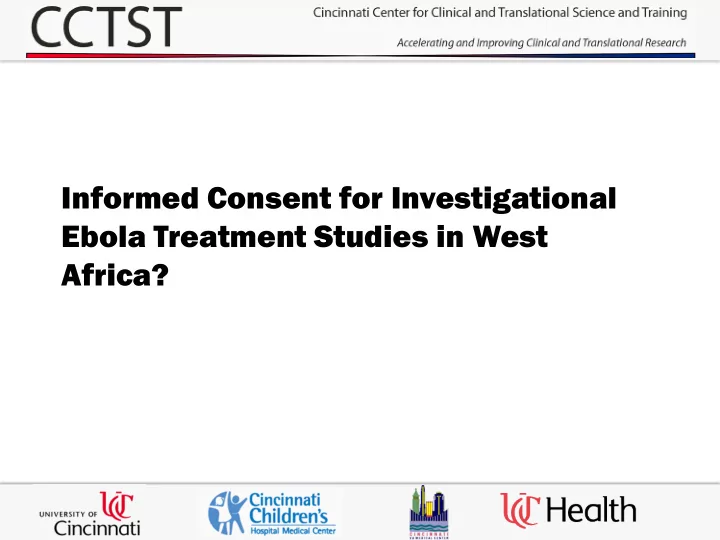

Informed Consent for Investigational Ebola Treatment Studies in West Africa?
Ethic ical al c conside iderat atio ions o s of experime imental al i interventio ions i s in the Ebola la o outbre reak Dr Annette Rid MD, Prof Ezekiel J Emanuel MD The Lancet - 22 August 2014 “…it is more likely than not that the interventions will not improve or save patients, and might even weaken them as they battle a life-threatening disease.” “…to enhance social value and scientific validity, clinical trials should be randomised with participants receiving either experimental interventions with supportive care or supportive care and placebo.”
Should informed consent be required? “…and the patient must give his or her informed consent, which would include having an appreciation of the risks and how little is known about the drug.” George Annas, chair and professor of health law, bioethics and human rights at BUSPH “Sound informed consent is needed with appropriate ‘quiz’ type questions to ensure comprehension by volunteer subjects.” Arthur L. Caplan, Ph.D., Professor and founding head of the Division of Bioethics at New York University Langone Medical Center. “Clear explanations of the purposes of trials to those in the affected communities will be vital as well as obtaining informed consent from patients or their immediate relatives,“ Peter Smith, epidemiologist at the London School of Hygiene & Tropical Medicine
Ethic ical al c conside iderat atio ions f s for u use o of unregist istered i d interventio ions f s for Ebola v vir irus dise disease ( (EVD) Summary of the panel discussion WHO statement 12 August 2014 Ethical criteria must guide the provision of such interventions. These include transparency about all aspects of care, informed consent, freedom of choice, confidentiality, respect for the person, preservation of dignity and involvement of the community.
“Whereas Westerners might immediately consent to trying an experimental drug faced with the 56% chance of death in the current epidemic, in Africa there is a deep seated mistrust around drug trials conducted by foreign organisations.” Arie Sophie. Ebola: an opportunity for a clinical trial? BMJ 2014;349:g4997
Mental health: Tailor informed-consent processes Mónica Ruiz-Casares Nature 513, 304 (18 September 2014) Some communities value verbal agreements more than written contracts, which they might view with suspicion. The very act of requesting signatures could create mistrust and the misperception that participants are entering into binding agreements that they will not be able to withdraw from. In places with repressive political regimes or for undocumented immigrants, signed consent could put participants in danger. Women who make decisions about their own or their children's participation in research without their partner's consent could face serious family conflict or even violence. Informed consent at the community level can conflict with Western standards for voluntary individual decisions. I
Mental health: Tailor informed-consent processes Mónica Ruiz-Casares Nature 513, 304 (18 September 2014) Collaborative partnerships make for better research and boost the utility of findings. Assessing voluntary involvement is essential to produce valid research. Local beliefs about who has decision-making authority must be considered. Children separated from their parents or orphaned Researchers must also think about potential consequences that a research project might have on participants and their community. Alternative procedures tailor information and consent to participants' needs.
Can patients with a fatal disease can make a well-informed decision about using unapproved treatments? “Dying people grasp at straws, ” “This is a setting where people are already accusing the infection-control agencies of all sorts of nefarious things — stealing organs, spreading disease, performing nefarious research, ” Sprecher says. “You would want to be really transparent in your actual research to make sure nobody misunderstands. ” “…gaining consent from affected communities, not just individuals, to boost understanding of the research. ” Armand Sprecher, Doctors Without Borders,
Recommend
More recommend